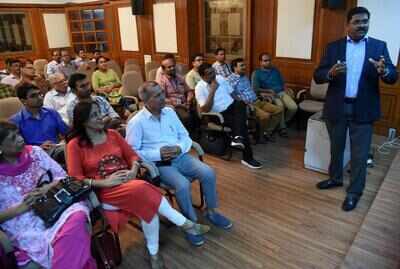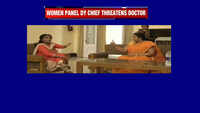
Nagpur: Hard work and patience is conducive to nurturing of talent. Every executive dealing with talent management and recruitment should undergo pertinent training, said general manager of Human Resources (HR) at CEAT Limited, Amjad Khan, on Tuesday.
He was delivering the keynote address at a session on ‘War for talent’, organized by VIA HRD Forum at Udyog Bhavan. The convener of VIA HRD Forum, Neelam Bowade, conducted the session. Vice-president of VIA, Suresh Rathi and co-chairman of the forum Suresh Pandilwar, were present.
In his welcome address, Rathi stressed upon the relevance of the topic in this era of the lucrative start-up culture. He said, “There was a time when investors did not provide capital for start-ups. That scenario is well in the past and the times are changing rapidly. If you have an innovative idea, there is a big market of investors with various financial schemes.”
Revealing the history behind the term ‘War for talent’, Khan said, “It was coined by Steven Hankin of McKinsey & Company in 1997.” He added that it refers to an increasingly competitive landscape for recruiting and retaining talented employees.
Khan believes there is war owing to the limited pool of talent. Defining propelling reasons for this war, he said, “War for talent has always existed. But, today, it is not just challenging, it is downright complex. The driving reasons are skill gaps and talent shortage, changing demographics, changing face of talent and business turbulence. Everyday, people are grappling on how to look at businesses.”
“In this globalized world, employees have more choices than before. The new generation has a culture of expectations. The pay and benefits scene is outdated and people want bonus for the extra work they do. Today’s manpower does not demand only salary. They need a purpose and meaning in the work they do,” he said.
Suggesting solutions on how to win the war for talent, Khan led to the belief of having more sophisticated techniques to attract, engage and retain individuals. He mentioned points like reshaping jobs, helping employees reshape life outside work and the balance of skills.
He placed the onus on HR officials to focus on the growth and engagement of internal people by having strong channels of communication and platforms of reward and recognition.
The symposium was followed by an interactive session where Khan answered questions posed by the audience.
Pandilwar proposed a vote of thanks.
ends
He was delivering the keynote address at a session on ‘War for talent’, organized by VIA HRD Forum at Udyog Bhavan. The convener of VIA HRD Forum, Neelam Bowade, conducted the session. Vice-president of VIA, Suresh Rathi and co-chairman of the forum Suresh Pandilwar, were present.
In his welcome address, Rathi stressed upon the relevance of the topic in this era of the lucrative start-up culture. He said, “There was a time when investors did not provide capital for start-ups. That scenario is well in the past and the times are changing rapidly. If you have an innovative idea, there is a big market of investors with various financial schemes.”
Revealing the history behind the term ‘War for talent’, Khan said, “It was coined by Steven Hankin of McKinsey & Company in 1997.” He added that it refers to an increasingly competitive landscape for recruiting and retaining talented employees.
Khan believes there is war owing to the limited pool of talent. Defining propelling reasons for this war, he said, “War for talent has always existed. But, today, it is not just challenging, it is downright complex. The driving reasons are skill gaps and talent shortage, changing demographics, changing face of talent and business turbulence. Everyday, people are grappling on how to look at businesses.”
“In this globalized world, employees have more choices than before. The new generation has a culture of expectations. The pay and benefits scene is outdated and people want bonus for the extra work they do. Today’s manpower does not demand only salary. They need a purpose and meaning in the work they do,” he said.
Suggesting solutions on how to win the war for talent, Khan led to the belief of having more sophisticated techniques to attract, engage and retain individuals. He mentioned points like reshaping jobs, helping employees reshape life outside work and the balance of skills.
He placed the onus on HR officials to focus on the growth and engagement of internal people by having strong channels of communication and platforms of reward and recognition.
The symposium was followed by an interactive session where Khan answered questions posed by the audience.
Pandilwar proposed a vote of thanks.
ends
World Cup 2019
Trending Topics
LATEST VIDEOS
More from TOI
Navbharat Times
Featured Today in Travel
Quick Links
Lok Sabha Election Schedule 2019Lok Sabha Election NewsDelhi Capitals teamMI team 2019Rajasthan Royals 2019RCB team 2019Maharashtra Lok Sabha ConstituenciesBJP Candidate ListBJP List 2019 TamilnaduShiv Sena List 2019AP BJP List 2019Mamata BanerjeeBJP List 2019 MaharashtraPriyanka GandhiBJP List 2019 KarnatakaAMMK Candidate List 2019BJP List 2019 WBLok Sabha Elections in Tamil NaduBSP List 2019 UPNews in TamilLok Sabha Poll 2019Satta Matka 2018PM ModiMahagathbandhanNagpur BJP Candidate ListChandrababu NaiduTamil Nadu ElectionsUrmila MatondkarNews in TeluguMadras High CourtTejashwi YadavArvind KejriwalTejasvi SuryaPawan KalyanArvind KejriwalYogi AdityanathJaya PradaSatta King 2019Srinagar encounter
Get the app







